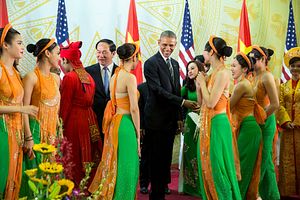U.S. President Barack Obama, the third consecutive American president to visit Vietnam since the normalization of Vietnam-US relations, has concluded a trip that considerably deepens the bilateral relationship.
But in an evolving regional context characterized by a shifting Sino-U.S. relationship, the growing role of ASEAN as a key player in the construction of regional security architecture, and recent developments related to the South China Sea, the visit has raised questions whether Hanoi and Washington are “ganging up” to contain or to counter China. I would argue that it is not the case.
The efforts to boost Vietnam-U.S. relations should be seen against the broader context of Vietnam’s diplomacy since the early 1990s. Since 1986, Vietnam has been following a course of comprehensive reforms, part of which is an independent, diversified and multi-directonal foreign policy with a view to constructing an external peaceful and cooperative environment, favorable for pursuing its national interests that include economic growth, domestic unity, national sovereignty, as well as the socialist mode of political, social and economic development.
In July 2013, Vietnam and the United States agreed to elevate their relationship to a “comprehensive partnership” designed to further promote bilateral ties in all fields.
It is noteworthy that the enhancement of Vietnam-US relations ran parallel with Vietnam’s forging of its relations with China, a big neighbor that is of increasing importance to Vietnam’s peace, stability and prosperity. The two countries established a framework of “comprehensive strategic partnership” in 2008.
Vietnam-U.S. relations are not developing at the expense of the links between Vietnam and China. Instead of choosing sides, Hanoi tries its best to promote relations with both China and the United States and sees its relations with them in positive-sum terms.
For industrialization and modernization, Vietnam attaches greater importance to the United States as a main source of market, investment, technology, and know-how. Other countries, including China, have consolidated their relations with the United States for the same reason. Enhanced Vietnam-U.S. relations also provide Vietnam with greater diplomatic and strategic resources. The United States supports ASEAN playing a central role in shaping the regional security structures in the Asia-Pacific region and assists ASEAN members, including Vietnam, to build their capacities. That includes improving their maritime domain awareness and maritime security capabilities.
In September 2011, Vietnam and the United States signed an MOU to advance bilateral defense cooperation in five areas including maritime security, search and rescue, U.N. peacekeeping operations, humanitarian and disaster relief, and collaboration between defense universities and research institutes. During the just concluded visit, Obama announced the full lift of the weapon ban against Vietnam.
Yet, the boosting of the Vietnam-U.S. partnership is not meant to contain and counter China. The removal of the ban is mostly meant to facilitate Vietnam’s policy of diversifying sources of military equipment and weapons. The independent posture of Vietnam’s foreign policy applies especially to Vietnam’s defense policy where Vietnam strictly follows the principle of the “Three Nos” – Vietnam will not enter any military pact and become a military ally of any country, will not allow any country to set up a military base on its soil, and will not rely on any country to oppose any other country.
Recently, Hanoi has been under some domestic pressure to review this principle. Yet, adhering to it is still the policy mainstream.
As an ASEAN member, Vietnam has been more proactively joining ASEAN’s efforts in engaging all major powers through the ASEAN-led cooperative schemes. The regional grouping’s track record suggests that ASEAN is not a military pact or under any big power’s influence, but an organization that promotes diplomacy to settle differences.
Besides, for Vietnam, ttaking sides is neither appropriate nor feasible, since both the United States and China, despite and because of their differences, are working on a new relationship that attaches great importance to avoiding military confrontation, and at the same time boosting their relations in all fields.
As a relatively small country closely watching the Sino-US relationship, Vietnam is concerned about two extreme scenarios: one where Beijing and Washington engage in direct confrontation, and another where the two sides compromise at the expense of other countries.
Hanoi’s concern is not unfounded, since historical records have suggested that Vietnam was affected by the ups and downs in the Sino-US relationship during the Cold War.
Therefore, the policy option that works best for Vietnam is to befriend both the United States and China, to be proactive in ASEAN, and to adhere to the universal principles of international laws and the regional well-established norms of behavior and codes of conduct. The improvement of Vietnam-U.S. relations will reinforce these trends.
Dr. Nguyen Vu Tung is acting president of the Diplomatic Academy of Vietnam. The views expressed in this article are personal and do not necessarily reflect those by the institutions that he is associated with. This article was originally published over at Global Times here and is republished with permission.
































